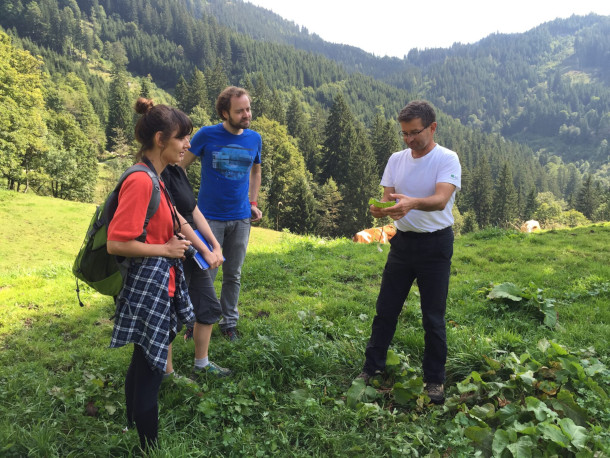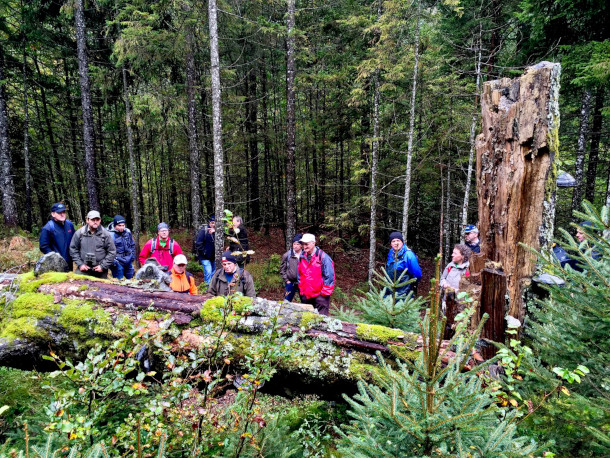Europe Votes to Restore Nature
Air Date: Week of July 28, 2023

Austrian ecosystem researcher Andreas Böhner and several graduate student assistants monitor soil chemistry and plant growth in an alpine pasture within a protected area, where agriculture co-exists with nature conservation. (Photo: Bob Berwyn)
To address the main causes of biodiversity loss, the European Union Parliament has approved a nature restoration plan, designed to restore at-risk ecosystems like wetlands. The goal is to conserve 30% of EU territory by 2030. Inside Climate News reporter Bob Berwyn joins host Aynsley O’Neill to discuss.
Transcript
O’NEILL: Biodiversity across the world is in trouble. Scientists have warned that one million species of an estimated total of eight million are threatened with extinction, many within decades. So, in order to address the main drivers of biodiversity loss, the European Parliament has adopted a nature restoration plan. The goal is to ensure that 30% of EU territory consists of natural areas by 2030. This is part of the European Green Deal, approved in 2020, which is a set of policy initiatives by the European Commission with the aim to bring the EU into climate neutrality by 2050. The law now faces further refinement by the EU commission and the EU Council, where government representatives could come together and agree on the law’s final form as soon as December. Here to talk about the European Union measure to protect biodiversity is Inside Climate News reporter Bob Berwyn. He joins us now from Austria. Welcome to Living on Earth Bob!
BERWYN: Thanks for having me.
O'NEILL: We're talking about an area that spans more than 4 million square kilometers. How badly have these affected natural areas? You know, forests, wetlands, lakes, how badly have they been degraded?
BERWYN: The EU itself estimates that about 80% of its natural areas are not in good shape. So there's a lot of need for restoration. Forests are especially hard hit, rivers through diversions and through pollution, ocean areas, the Mediterranean coastal Atlantic from marine heat waves that have just decimated marine life. There have been multiple mass mortality events from marine heat waves in the Mediterranean.
O'NEILL: And Bob, you're a science reporter. So can you tell us about some of the science behind this? What is some of the science behind protecting wetlands, for example?
Climate activist Greta Thunberg joined a demonstration outside the EU Parliament to call on lawmakers to back a flagship nature restoration law pic.twitter.com/DC1dggvLRN
— Reuters (@Reuters) July 11, 2023
BERWYN: Right, I'll give a little big picture background first, and that is that major global science reports in the last few years, such as from the IPCC, the Intergovernmental Panel on Climate Change, have all said that repairing these damaged ecosystems is really key to ensuring a sustainable, livable planet, and also to slowing down global warming and addressing climate change, specifically to wetlands. And this holds true not just for Europe, but many areas globally, North America, the US also many, many wetland areas were drained during settlement and colonialization for agricultural areas, because they overlap with that. And some are are not needed as much as they were because we've intensified agriculture. So some are just sitting there and many could be restored rewetted and would serve multiple purposes. And there's a lot of peer reviewed scientific studies showing that if you re-water X amount of wetlands, they absorb that much more carbon it's a measurable benefit. And restoring wetlands has other benefits as well, too. It's just hugely critical for wildlife habitat. So you get the benefits of having habitat for insects and reptiles, amphibians, which are threatened, and then in turn birds and so forth. And healthy wetlands also help attenuate floods and help sort of act as sponges if there's extreme rainfall, which is happening a lot with climate, and they can absorb the water as a sponge when it runs down. And then they release it more slowly and keep streams flowing through through drier times.
O'NEILL: And we mentioned the Mediterranean Sea, hammered by marine heatwaves, mass mortality events, how do we go about restoring that area?

A group of Austrian farmers and forest owners tour an Alpine wilderness forest that could someday be expanded under the EU’s new nature restoration law. They were there to learn about the ecological benefits of expanding areas where natural processes prevail. (Photo: Bob Berwyn)
BERWYN: So within an area like the Mediterranean, which is a good example, because it's an enclosed sea, you know, there are pockets of good habitat, there are places where the waters deeper, there are places where some species are going to be able to persist. If you can protect those and ensure that there are good habitat conditions for the fish in those areas, perhaps they'll be able to survive, you know, another 50 years until we've kind of leveled off the global warming graph. And you know, a great example that comes to mind are seagrass beds that also have multiple benefits, sort of like wetlands, they're really important for sea turtles and they need to be in the right places. And they also absorb a lot of carbon. So there's a lot of efforts right now being aimed at trying to protect what seagrass beds remain, a lot of them were damaged by fishing. Some are losing ground, also because of global warming. And there's probably not too much that can be done about that. But the ones that can be protected should be.
O'NEILL: And I mean, we've been talking up all the benefits of this law, but as there always are, there are some naysayers. There are some opponents who opposes this law and what is their reasoning behind it.

The Imielty Ług nature reserve in Poland consists of ponds that cover a total of more than 2,000 hectares (4,900 acres) and wetlands that lead to open water. The EU nature law seeks to restore and protect natural areas like the Imielty Ług nature reserve. (Photo: Lysy, Wikimedia Commons, CC BY-SA 3.0)
BERWYN: So the vote on the law was pretty close and the European Parliament is big, and it's rowdy, and it has a whole bunch of different groupings, and it was opposed by a coalition of center right, all the way to the right wing parties for a variety of reasons. Some of the bigger main conservative parties opposed it supposedly on behalf of agricultural interests. The claims made by conservation advocates who back the law say that those parties are influenced by the same lobbyists that influence politics everywhere else fossil fuel companies who produce pesticides who produce artificial fertilizers, big agribusinesses, international grain companies and food producers who don't think they have anything to gain from more sustainable food production. Certainly there were farmers and you know, there visible, you can see pictures of tractors farmers driving their tractors to protest. It wasn't always clear from talking to them, or from seeing interviews with them, that they really understood the law itself. I think in a lot of cases, there was a bit of a scare campaign organized to create the perception of a threat to food supply, but all those arguments were made without any sort of scientific support. On the other hand, the European Union has produced multiple studies their own environmental agency showing how if you start to use more regenerative farming practices and start restoring the soil, you're actually going to get benefits from that in terms of food productivity. And if you protect insect biodiversity, which is crucial to agriculture, you're going to have better agriculture as well. It's not really about nature, some of the main proponents have said this. It's about us, we can't exist without healthy nature. We can't we can keep borrowing from nature's piggy bank, so to say, but it's going to be empty at some point. Yeah, nature is amazing, it has the capacity to really heal itself and relatively quickly but we're hammering it and it's time to reverse that.
O'NEILL: Bob Berwyn is a science reporter for InsideClimate News. Bob, thank you for joining us today.
BERWYN: My pleasure. Thanks very much for having me, it was great to be able to talk about this important law.
Links
Inside Climate News “European Union Approves Ambitious Nature Restoration Law”
Living on Earth wants to hear from you!
Living on Earth
62 Calef Highway, Suite 212
Lee, NH 03861
Telephone: 617-287-4121
E-mail: comments@loe.org
Newsletter [Click here]
Donate to Living on Earth!
Living on Earth is an independent media program and relies entirely on contributions from listeners and institutions supporting public service. Please donate now to preserve an independent environmental voice.
NewsletterLiving on Earth offers a weekly delivery of the show's rundown to your mailbox. Sign up for our newsletter today!
 Sailors For The Sea: Be the change you want to sea.
Sailors For The Sea: Be the change you want to sea.
 The Grantham Foundation for the Protection of the Environment: Committed to protecting and improving the health of the global environment.
The Grantham Foundation for the Protection of the Environment: Committed to protecting and improving the health of the global environment.
 Contribute to Living on Earth and receive, as our gift to you, an archival print of one of Mark Seth Lender's extraordinary wildlife photographs. Follow the link to see Mark's current collection of photographs.
Contribute to Living on Earth and receive, as our gift to you, an archival print of one of Mark Seth Lender's extraordinary wildlife photographs. Follow the link to see Mark's current collection of photographs.
 Buy a signed copy of Mark Seth Lender's book Smeagull the Seagull & support Living on Earth
Buy a signed copy of Mark Seth Lender's book Smeagull the Seagull & support Living on Earth

